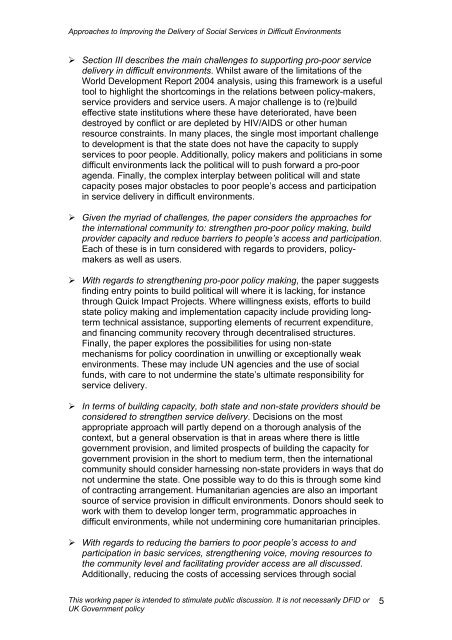Approaches to Improving the Delivery of Social Services in Difficult ...
Approaches to Improving the Delivery of Social Services in Difficult ...
Approaches to Improving the Delivery of Social Services in Difficult ...
Create successful ePaper yourself
Turn your PDF publications into a flip-book with our unique Google optimized e-Paper software.
<strong>Approaches</strong> <strong>to</strong> <strong>Improv<strong>in</strong>g</strong> <strong>the</strong> <strong>Delivery</strong> <strong>of</strong> <strong>Social</strong> <strong>Services</strong> <strong>in</strong> <strong>Difficult</strong> Environments‣ Section III describes <strong>the</strong> ma<strong>in</strong> challenges <strong>to</strong> support<strong>in</strong>g pro-poor servicedelivery <strong>in</strong> difficult environments. Whilst aware <strong>of</strong> <strong>the</strong> limitations <strong>of</strong> <strong>the</strong>World Development Report 2004 analysis, us<strong>in</strong>g this framework is a useful<strong>to</strong>ol <strong>to</strong> highlight <strong>the</strong> shortcom<strong>in</strong>gs <strong>in</strong> <strong>the</strong> relations between policy-makers,service providers and service users. A major challenge is <strong>to</strong> (re)buildeffective state <strong>in</strong>stitutions where <strong>the</strong>se have deteriorated, have beendestroyed by conflict or are depleted by HIV/AIDS or o<strong>the</strong>r humanresource constra<strong>in</strong>ts. In many places, <strong>the</strong> s<strong>in</strong>gle most important challenge<strong>to</strong> development is that <strong>the</strong> state does not have <strong>the</strong> capacity <strong>to</strong> supplyservices <strong>to</strong> poor people. Additionally, policy makers and politicians <strong>in</strong> somedifficult environments lack <strong>the</strong> political will <strong>to</strong> push forward a pro-pooragenda. F<strong>in</strong>ally, <strong>the</strong> complex <strong>in</strong>terplay between political will and statecapacity poses major obstacles <strong>to</strong> poor people’s access and participation<strong>in</strong> service delivery <strong>in</strong> difficult environments.‣ Given <strong>the</strong> myriad <strong>of</strong> challenges, <strong>the</strong> paper considers <strong>the</strong> approaches for<strong>the</strong> <strong>in</strong>ternational community <strong>to</strong>: streng<strong>the</strong>n pro-poor policy mak<strong>in</strong>g, buildprovider capacity and reduce barriers <strong>to</strong> people’s access and participation.Each <strong>of</strong> <strong>the</strong>se is <strong>in</strong> turn considered with regards <strong>to</strong> providers, policymakersas well as users.‣ With regards <strong>to</strong> streng<strong>the</strong>n<strong>in</strong>g pro-poor policy mak<strong>in</strong>g, <strong>the</strong> paper suggestsf<strong>in</strong>d<strong>in</strong>g entry po<strong>in</strong>ts <strong>to</strong> build political will where it is lack<strong>in</strong>g, for <strong>in</strong>stancethrough Quick Impact Projects. Where will<strong>in</strong>gness exists, efforts <strong>to</strong> buildstate policy mak<strong>in</strong>g and implementation capacity <strong>in</strong>clude provid<strong>in</strong>g longtermtechnical assistance, support<strong>in</strong>g elements <strong>of</strong> recurrent expenditure,and f<strong>in</strong>anc<strong>in</strong>g community recovery through decentralised structures.F<strong>in</strong>ally, <strong>the</strong> paper explores <strong>the</strong> possibilities for us<strong>in</strong>g non-statemechanisms for policy coord<strong>in</strong>ation <strong>in</strong> unwill<strong>in</strong>g or exceptionally weakenvironments. These may <strong>in</strong>clude UN agencies and <strong>the</strong> use <strong>of</strong> socialfunds, with care <strong>to</strong> not underm<strong>in</strong>e <strong>the</strong> state’s ultimate responsibility forservice delivery.‣ In terms <strong>of</strong> build<strong>in</strong>g capacity, both state and non-state providers should beconsidered <strong>to</strong> streng<strong>the</strong>n service delivery. Decisions on <strong>the</strong> mostappropriate approach will partly depend on a thorough analysis <strong>of</strong> <strong>the</strong>context, but a general observation is that <strong>in</strong> areas where <strong>the</strong>re is littlegovernment provision, and limited prospects <strong>of</strong> build<strong>in</strong>g <strong>the</strong> capacity forgovernment provision <strong>in</strong> <strong>the</strong> short <strong>to</strong> medium term, <strong>the</strong>n <strong>the</strong> <strong>in</strong>ternationalcommunity should consider harness<strong>in</strong>g non-state providers <strong>in</strong> ways that donot underm<strong>in</strong>e <strong>the</strong> state. One possible way <strong>to</strong> do this is through some k<strong>in</strong>d<strong>of</strong> contract<strong>in</strong>g arrangement. Humanitarian agencies are also an importantsource <strong>of</strong> service provision <strong>in</strong> difficult environments. Donors should seek <strong>to</strong>work with <strong>the</strong>m <strong>to</strong> develop longer term, programmatic approaches <strong>in</strong>difficult environments, while not underm<strong>in</strong><strong>in</strong>g core humanitarian pr<strong>in</strong>ciples.‣ With regards <strong>to</strong> reduc<strong>in</strong>g <strong>the</strong> barriers <strong>to</strong> poor people’s access <strong>to</strong> andparticipation <strong>in</strong> basic services, streng<strong>the</strong>n<strong>in</strong>g voice, mov<strong>in</strong>g resources <strong>to</strong><strong>the</strong> community level and facilitat<strong>in</strong>g provider access are all discussed.Additionally, reduc<strong>in</strong>g <strong>the</strong> costs <strong>of</strong> access<strong>in</strong>g services through socialThis work<strong>in</strong>g paper is <strong>in</strong>tended <strong>to</strong> stimulate public discussion. It is not necessarily DFID orUK Government policy5
















